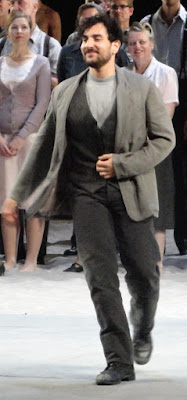(review in English below)
Depois de
assistir recentemente a esta opera no Teatro de São Carlos, tive a oportunidade
de ver o Nabucco de G. Verdi na Royal Opera House de Londres.
A produção de Daniele Abbado é excessivamente austera
e algo confusa. O palco está ocupado por vários paralelepípedos de tamanhos
diferentes assentes num chão de areia, podendo simular pedras tumulares, e
assim permanece ao longo de quase toda a ópera. Só nos últimos actos o palco fica
totalmente vazio, sendo para ele transportadas figuras de partes humanas em
construções de arame que, no final, representarão um deus a ser destruído pelos
hebreus. Há projecções de vídeos no fundo, mas o efeito não é muito eficaz.
Procura-se uma transição da acção para o que se passou na 2ª guerra mundial com
a perseguição e exílio dos judeus, mas esta não é claramente conseguida.
Dirigiu a Orquestra da Royal Opera o maestro Daniele Abbado, numa actuação que não
foi perfeita, ao contrário do Coro da Royal
Opera que foi fantástico.
O melhor cantor
da noite foi o baixo John Relyea que
fez um Zaccaria muito convincente, de bela voz e timbre cavernoso, mantendo a
mesma qualidade vocal em todos os registos.
A Fenena foi
interpretada por Jamie Barton que
tem uma voz imponente e sempre afinada, mas a figura não ajuda a personagem.
O Ismaele do
tenor Leonardo Capalbo esteve muito
bem, a voz é bonita e bem colocada e o cantor teve um bom desempenho cénico.
A soprano
ucraniana Tatiana Melnychenko foi uma
Abigaille de voz forte e timbre agreste, excessivamente dura na interpretação,
com grande tendência para gritar. A personagem e desempenho cénico não são nada
ajudados pela figura da cantora.
O barítono Dimitri Platanias foi um Nabucco
correcto, de voz bonita e sempre bem audível, mas sem aquela centelha de
excelência que sempre se espera ver nestas paragens.
No cômputo final,
foi um bom espectáculo, mas aquém do Nabucco que se pôde ver há poucas semanas
no Teatro de São Carlos em Lisboa.
***
NABUCCO,
Royal Opera House, London, June 2016
After
recently attending this opera at the Teatro de São Carlos in Lisbon, I had the
opportunity to see Nabucco by G. Verdi at the Royal Opera House in London.
The
production of Daniele Abbado is too
austere and somewhat confusing. The stage is occupied by several cobblestones
of different sizes based on a sandy ground, simulating gravestones, and remains
so throughout almost the entire opera. In the last act the stage is completely
empty, and figures of human parts in wire constructions are brought in that, in
the end, represent a god to be destroyed by the Hebrews. There are projections
of videos in the background, but the effect is not fantastic. There is a
transition of the action to what happened in the 2nd World War the persecution
and exile of the Jews, but this is not clearly achieved.
Maestro Daniele Abbado conducted the Orchestra of the Royal Opera in a
performance that was not perfect, unlike the Royal Opera Choir that was fantastic.
The best
singer of the night was bass John Relyea
who was a very convincing Zaccaria, a beautiful voice and cavernous timbre,
with the same quality in all registers.
Fenena was
played by Jamie Barton. She has an
imposing and always tuned voice, but the figure does not help the character.
Tenor Leonardo Capalbo was a very good Ismaele,
the voice is beautiful and well placed and the singer had a good scenic
performance.
Ukrainian
soprano Tatiana Melnychenko was a
strong voiced Abigaille with a rough timbre and excessively harsh interpretation,
with great tendency to scream. The character and stage performance were
jeopardized by the figure of the singer.
Baritone Dimitri Platanias was a correct
Nabucco, with a beautiful always well audible voice, but without that spark of
excellence we always expected to get in these theaters.
Overall, it
was a good performance, but inferior to the Nabucco that I could see a few
weeks ago at the Teatro São Carlos in Lisbon.
***
















Sem comentários:
Enviar um comentário